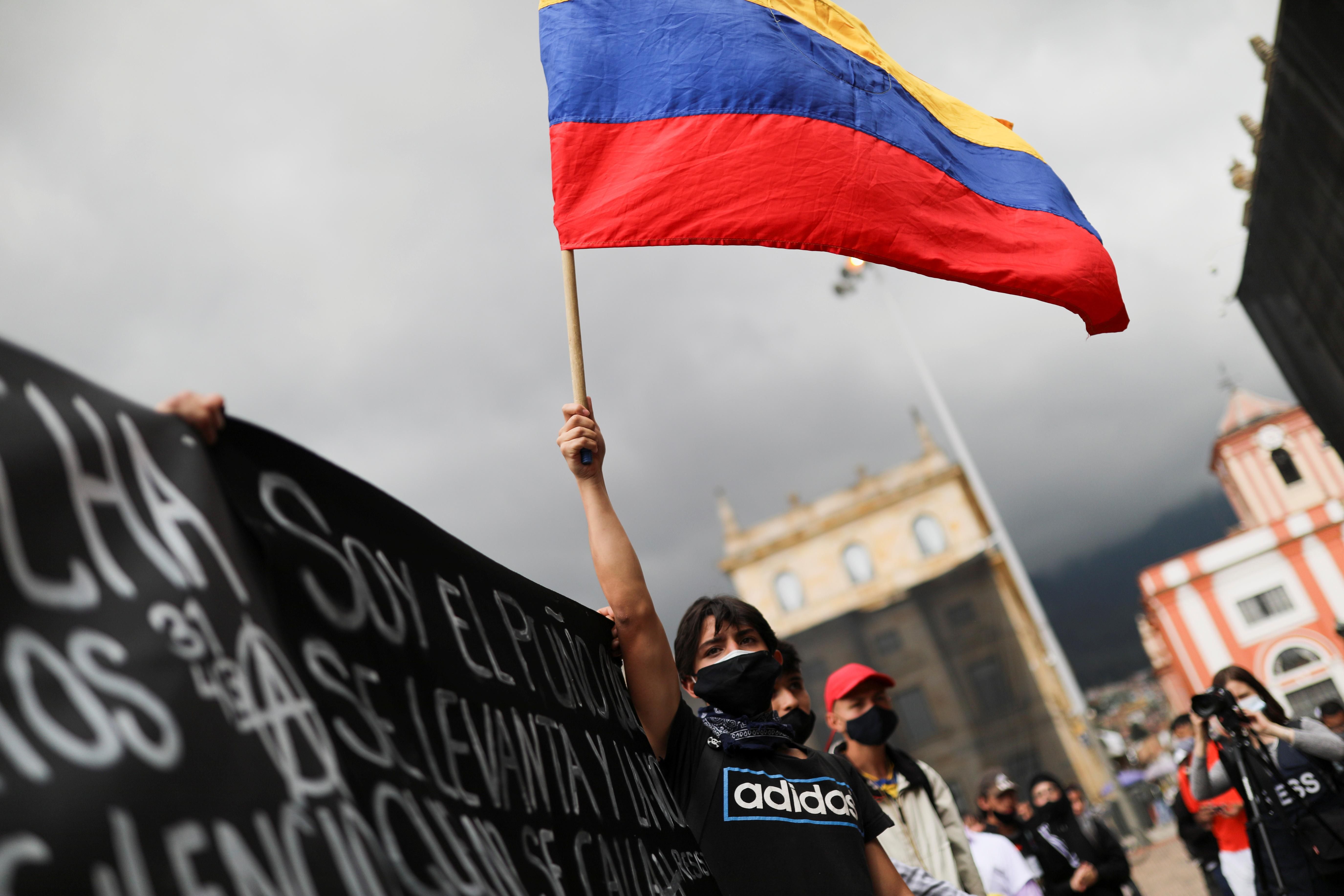April 29, 2021
Protests are back in Colombia: This week, tens of thousands of Colombians hit the streets of the country's big cities in the first major wave of street action since the late 2019 mass protests over inequality. The primary trigger for the current demonstrations was a major proposed tax increase. The government says the tax hike is necessary in order to give the state the resources it needs to pull Colombia out of the COVID-induced economic crisis, but critics say that some of its provisions — in particular services taxes — inflict too much of a burden on an already-suffering middle class. Protesters also highlighted other issues, such as the unchecked killing of social activists, broadening insecurity in the country, and frustration with the slow pace of the five-year old peace process. When GZERO Media spoke to prominent Colombian journalist Camila Zuluaga last year, she warned that pent-up grievances from before the pandemic would lead to a fresh "social explosion" this year. It looks like the fuse has been lit. The next major protest has been called for May 19.
Crucial state elections in COVID-devastated India: India is now the global epicenter of the coronavirus pandemic, with over 3,600 deaths recorded on Thursday alone. But that didn't stop Prime Minister Narendra Modi from urging millions of Indians to vote in-person in the final stage of a state election in West Bengal, a race with nationwide political implications: Modi's ruling BJP party thinks it has a shot at winning in West Bengal, which the BJP has never governed and is currently run by Mamata Banerjee, one of the PM's fiercest critics. However, Modi's flouting of COVID safety norms in order to secure a political win may have backfired: exit polls now show Banerjee is likely to stay in power despite the BJP's strong performance in recent voter surveys. If the numbers hold, it'll be a major blow to Modi, who has until now defied political gravity to maintain a high public approval rating despite his government's poor handling of the pandemic and other political crises. We'll be watching to see if the BJP receives further blowback from Indians if bodies keep piling up across the country.
As COVID crisis worsens, Turkey locks down: As many parts of Europe start to reopen after a relentless third wave of infection, Turkey is now entering a strict national lockdown for the first time since the pandemic began. Although the country was praised by the World Health Organization last fall for its containment efforts, the COVID crisis has exploded there in recent weeks, and it's now the worst in Europe: Turkey recorded a high of 60,000 daily infections in late April, 10 times more than in February. Critics say that President Recep Tayyip Erdogan lifted COVID restrictions too early, and that the vaccine rollout remains sluggish (because of vaccine shortages, second shots in Turkey are being given six-eight weeks after the first dose, rather than the advised 28 days). The highly contagious UK variant B.1.1.7 is the most dominant strain throughout Turkey, experts say, and reflects the fact that despite fast inoculation drives in countries like Israel, the US and the UK, the global health crisis is far from over. Turkey's lockdown measures will be in force until at least May 17, a massive blow for Turks wanting to spend Ramadan and Iftar meals with extended family and friends.
From Your Site Articles
More For You
World Central Kitchen staff hand out free soup in a neighbourhood that experiences electricity and heating outages following recent Russian attacks on Ukraine’s civilian infrastructure during subzero temperatures in Kyiv, Ukraine February 3, 2026.
REUTERS/Thomas Peter
1,170: The number of high-rise buildings in Kyiv that were left without heating following a barrage of Russian attacks last night on Ukraine’s capital and its energy facilities, per Kyiv Mayor Vitali Klitschko.
Most Popular
What We’re Watching: US critical minerals summit, Rafah crossing reopens, Border violence in Pakistan
Feb 02, 2026
U.S. President Donald Trump and Japanese Prime Minister Sanae Takaichi hold up signed documents regarding securing the supply of critical minerals and rare earths, at a bilateral meeting at Akasaka Palace in Tokyo, Japan, October 28, 2025.
REUTERS/Evelyn Hockstein
Representatives from the European Union, United Kingdom, Japan, and others will meet in Washington this week to discuss a strategic alliance on critical minerals.
Hard numbers: Large protests in Czechia, UAE-linked firm has large stake in the president’s company, & More
Feb 02, 2026
People take part in a rally in support of Czech President Petr Pavel, organised by Million Moments for Democracy group in reaction to dispute between President Pavel and Czech Foreign Minister and Motorists chair Petr Macinka, in Prague, Czech Republic, February 1, 2026.
REUTERS/Eva Korinkova
80,000: The number of people estimated to be in the streets of Czechia on Sunday to show their support for President Petr Pavel after he blocked the nomination of an environmental minister who performed the Nazi salute and posted Nazi memorabilia.
US President Donald Trump and musician Nicki Minaj hold hands onstage at the US Treasury Department's Trump Accounts Summit, in Washington, D.C., USA, on January 28, 2026.
REUTERS/Kevin Lamarque
The US has started handing $1,000 to the bank accounts of newborn babies. But can policies like this one help boost sagging birthrates in advanced democracies?
© 2025 GZERO Media. All Rights Reserved | A Eurasia Group media company.
